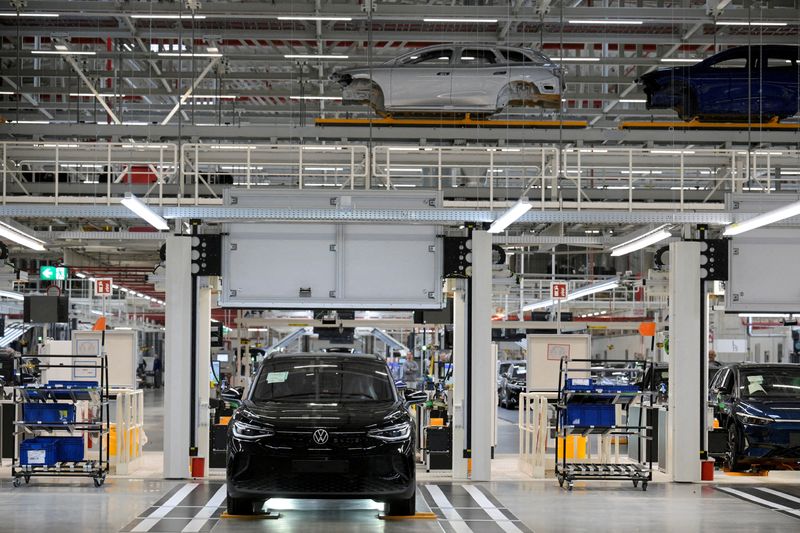VW faces strikes over 'Pandora's box' of plant closures as profits plunge
By Christina Amann and Andrey Sychev
WOLFSBURG, Germany (Reuters) -Workers at Volkswagen (ETR:VOWG_p ) threatened strikes on Wednesday unless management backed down from planned factory closures in Germany, spelling more trouble as profits at Europe's biggest carmaker plunged to a three-year low.
Volkswagen released its third-quarter results on the same day as a second round of increasingly bitter talks between VW and unions over wages and fixing the company's future, as high costs and weak demand in China dragged down sales.
VW's problems have fed wider anxieties about Germany's status as an industrial powerhouse and the competitiveness of European carmakers against encroaching global rivals.
German automakers also fear the impact of a standoff between the European Union and Beijing, with new EU tariffs of up to 45.3% on Chinese electric vehicles coming into force this week.
For Volkswagen, the Q3 results were further evidence that major change was needed to keep the company competitive.
But worker representatives accuse management of bungling decisions and tearing up a treasured consensus on decision-making. While unions are demanding a 7% pay rise, they say VW plans to shut three plants on home soil for the first time in the company's 87-year-history, as well as mass layoffs and 10% pay cuts for those who keep their jobs.
"And I say quite clearly that Volkswagen has opened Pandora (OTC:PANDY )'s box by terminating job security and other collective agreements, has jeopardised the trust of its employees and it is now up to Volkswagen to restore this trust," IG Metall union negotiator Thorsten Groeger said.
Workers expected a future for all German sites in the restructuring.
"Otherwise, I can say quite clearly that we will have to plan further escalation with our negotiating and collective bargaining committee," he told reporters.
Volkswagen on Wednesday reported a 42% drop in third-quarter profit, its lowest level in three years. VW's results showed its operating return on sales in the passenger car business fell to 2% from 3.4% in the nine months to September from the same period last year.
"This highlights the urgent need for significant cost reductions and efficiency gains," finance chief Arno Antlitz said in a statement.
Antlitz said he was confident that the company could reach an agreement with workers but could not rule out strikes, with the company considering more than 10 billion euros in cost cuts.
SHRINKING SALES
The European car market has shrunk by about 2 million vehicles since the pandemic, resulting in about 500,000 fewer unit sales for Volkswagen annually. Players such as Tesla (NASDAQ:TSLA ) and Chinese carmakers offering cheaper models have gained market share in Europe.
In China, Volkswagen has also lost market share as local competitors offer cheaper models, and this has been exacerbated by a wider slowdown in the Chinese economy due to a real estate crisis.
Volkswagen's deliveries to China, the world's biggest car market, fell by 15% to 711,500 vehicles in the third quarter. This dragged down the global figure, which dropped to 2.176 million vehicles.
Year-to-date, Volkswagen's stock has lost about a fifth, underperforming a drop of 10% in the pan-European automotive index.
Europe's top automaker in September had cut its annual outlook for the second time in less than three months, joining rivals BMW (ETR:BMWG ) and Mercedes-Benz (OTC:MBGAF ) in reporting difficulties.
Volkswagen works council head Daniela Cavallo earlier this week threatened to break off talks.
Unions cannot hold wider strikes until December as part of a previously agreed truce, but labour leaders have repeatedly threatened that workers would do whatever is in their power to prevent what they consider to be a breaking of taboos.
Wednesday's talks are scheduled to start at 1100 CET (1000 GMT), and Volkswagen earlier this week said it would put forward proposals on getting the company on track.
Management says the German plants are far more expensive to operate than the competition, driven by high costs for workers and energy.
($1=0.9244 euros)
Source: Investing.com
